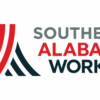Nearly 1,800 business owners across the state participated in the Alabama COVID-19 Workforce Response Survey.
Developed by AlabamaWorks, the survey results provide an in-depth look at the pandemic’s impact on Alabama’s employers and will, ultimately, help determine how private industry and state government together can best support the economy and get people back to work.
“We are grateful to the business owners who took the time to help us identify critical needs and priorities for a full workforce recovery. Utilizing the survey results, the Alabama Workforce Council will continue with our important work of assisting the state to the fullest extent possible with all workforce recovery efforts and continue to push career pathways and programs that are most resilient to create a more agile workforce” noted the Alabama Workforce Council’s Chairman, Tim McCartney.
A three-page report of the survey results can be found here: Workforce Response Survey Results and also on www.AlabamaWorks.com.
The Survey respondents were primarily (68 percent) small business owners with less than 25 employees, with 41 percent of respondents employing mostly hourly workers and 59 percent of the total who responded operating in just one county. The industries with the highest participation rate were other services, healthcare and social assistance, retail trade, hospitality and food services, and manufacturing.
Understandably, an overwhelming majority of respondents (82 percent) expect this pandemic to have a negative financial impact on their business and 33 percent of respondents have laid off employees as a result of the pandemic. Nearly half of respondents, though, expect their business climate to improve over the next 6 months. In addition, 53 percent of respondents indicated a hiring freeze during the pandemic. Respondents also expressed general concerns over the duration of the pandemic, availability of government assistance and retention of skilled workers, among other issues.
Importantly, 53 percent of businesses indicated that during and after the pandemic more employer-delivered, skills-based training would benefit their company, making it the form of training in highest demand.
Additional Survey results include:
- 53.4 percent of businesses reported that their current business climate is “bad,” but 49.6 percent of businesses expected their climate to improve in the next 6 months.
- 49.4 percent of businesses expect that their workforce size will remain relatively constant over the next 3 months.
- 35.9 percent of businesses reported that the biggest factor limiting business activity is a lack of market demand, making it the most common limiting factor.
- 46.3 percent of businesses felt at least somewhat equipped to handle the COVID-19 pandemic at its outbreak, indicating that most responding businesses felt inadequately prepared to some degree.
- More businesses (46 percent) are facing supply chain disruptions than not (39 percent).
In the coming weeks, AlabamaWorks and the Alabama Workforce Council will use the insightful data in discussions with various stakeholders surrounding the future of workforce in the state of Alabama.





















































